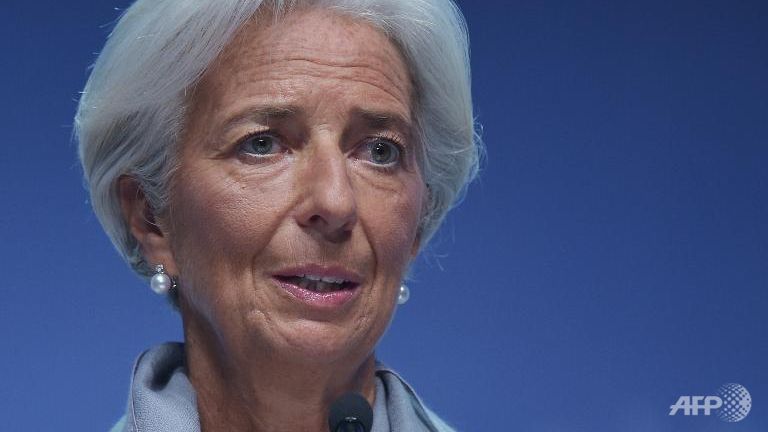IMF, ECB chiefs join Merkel, Hollande, Juncker for Greek debt talks
 |
| International Monetary Fund Managing Director Christine Lagarde in Washington. (Photo: AFP/Mandel Ngan) |
BERLIN: IMF chief Christine Lagarde and ECB president Mario Draghi unexpectedly joined the leaders of France and Germany as well as European Commission head Jean-Claude Juncker in Berlin late on Monday (Jun 1) for talks on Greece's debt crisis, diplomatic sources said.
The aim of the late-night meeting attended by Chancellor Angela Merkel and President Francois Hollande was to come up with "a final proposal" to present to Athens, according to German daily Die Welt.
But the German chancellor's office said after the meeting only that the quintet agreed to work together "intensely" in the coming days and would stay in "close contact in the coming days".
The newspaper, citing sources close to the talks, said the Berlin talks began at 1930 GMT and Greek Prime Minister Alexis Tsipras was in Athens "awaiting a phone call from the troika", as Greece's creditors are known.
According to a diplomatic source, the group did not telephone the Greek premier during the meeting.
The diplomatic push comes as cash-strapped Greece remains locked in tough negotiations with international creditors in a bid to release €7.2 billion (US$7.9 billion) in remaining bailout funds.
A deal has so far proved elusive as the creditors - the European Union, the International Monetary Fund and the European Central Bank - are demanding greater reforms in return for the cash, which Greece's anti-austerity government has refused to match.
The country faces a key deadline on Friday when it is due to repay €300 million to the IMF. There are fears Greece does not have the necessary funds and will default, possibly setting off a chain of events that could end with a messy exit from the euro.
Merkel, Hollande and Juncker met for scheduled talks earlier Monday but the evening arrivals of Lagarde and Draghi came as a surprise.
The impromptu gathering followed a phone conference Sunday between Merkel, Hollande, Juncker and Tsipras, which Merkel's spokeswoman described as "constructive".
Juncker earlier told another German newspaper that Greece's woes would feature heavily in Monday's Berlin discussions, as he reiterated his opposition to a so-called "Grexit".
"I don't share this idea that we'd have fewer concerns and constraints if Greece gave up the euro," he told the Sueddeutsche Zeitung.
What the stars mean:
★ Poor ★ ★ Promising ★★★ Good ★★★★ Very good ★★★★★ Exceptional
Latest News
More News
- Russian President congratulates Vietnamese Party leader during phone talks (January 25, 2026 | 09:58)
- Worldwide congratulations underscore confidence in Vietnam’s 14th Party Congress (January 23, 2026 | 09:02)
- Political parties, organisations, int’l friends send congratulations to 14th National Party Congress (January 22, 2026 | 09:33)
- 14th National Party Congress: Japanese media highlight Vietnam’s growth targets (January 21, 2026 | 09:46)
- 14th National Party Congress: Driving force for Vietnam to continue renewal, innovation, breakthroughs (January 21, 2026 | 09:42)
- Vietnam remains spiritual support for progressive forces: Colombian party leader (January 21, 2026 | 08:00)
- Int'l media provides large coverage of 14th National Party Congress's first working day (January 20, 2026 | 09:09)
- Vietnamese firms win top honours at ASEAN Digital Awards (January 16, 2026 | 16:45)
- ASEAN Digital Ministers' Meeting opens in Hanoi (January 15, 2026 | 15:33)
- ASEAN economies move up the global chip value chain (December 09, 2025 | 13:32)
















 Mobile Version
Mobile Version